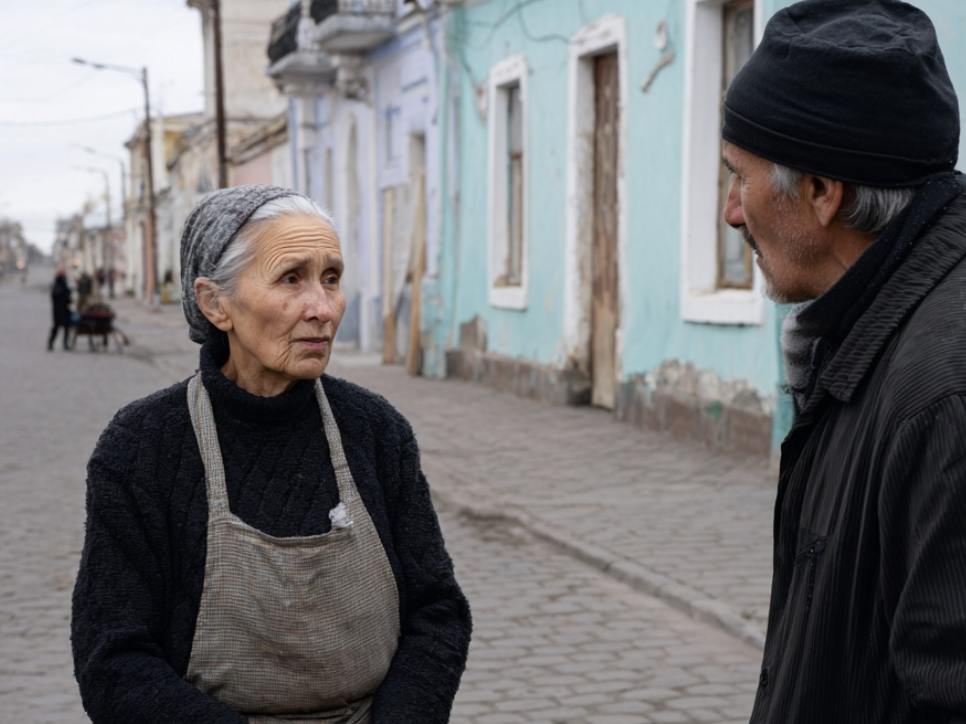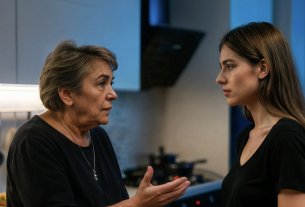The thin winter wind cut to the bone, curling around the city’s old streets as if reminding them of a time when people here still had warm hearts and honest eyes. Against the gray walls and peeling signs stood an elderly woman whose face was traced with a web of fine wrinkles—as though each line told its own story of pain, resilience, and lost hopes. In her hands she clutched a battered bag stuffed with empty glass bottles, like the last shards of a former life. Her eyes were wet; tears slid quietly down her cheeks, slow to dry in the cold air.
“Please, dear girl, have mercy on me…” she whispered, her voice trembling like a leaf in the wind. “I haven’t had bread for three days. I don’t have a single kopeck… Not one coin to buy even a piece.”
Her words hung in the air, but behind the glass door of the bread kiosk the saleswoman only shook her head indifferently. Her gaze was cold, carved from ice.
“How is that my problem?” she answered irritably. “This is a bread stall, not a bottle-return point. Can’t you read? The sign says in black and white: bottles are accepted at a special collection point, and then they give you money—for bread, for food, for life. What do you want from me?”
The old woman faltered. She didn’t know the bottle-return place was open only until noon. She was late. Late for that small chance that might have saved her from hunger. It had never occurred to her before to collect bottles. She had been a teacher, a woman with higher education, a proud stance, and a dignity she couldn’t lose even in the hardest days. But now—now she stood by the kiosk like a beggar and felt the bitter shame spread inside her.
“Well,” the saleswoman said, softening a little, “you need to sleep less. Tomorrow bring the bottles in earlier—come by and I’ll feed you.”
“Dear,” the woman pleaded, “give me at least a quarter of a loaf… I’ll pay you back tomorrow. My head is spinning… I can’t… I just can’t bear this hunger any longer.”
There was not a drop of compassion in the saleswoman’s eyes.
“No,” she cut her off sharply. “I don’t do charity. I’m barely making ends meet myself. Every day there are crowds asking, and I can’t feed everyone. Don’t hold up the line.”
A man in a dark overcoat stood nearby, lost in his thoughts. He seemed distant, as if he lived in another world—a world of concerns, decisions, the future. The saleswoman transformed at once, as though an important guest had appeared before her, not merely a customer.
“Hello, Pavel Andreyevich!” she exclaimed cheerfully. “Your favorite bread came today—with nuts and dried fruit. And the pastries are fresh, with apricot. The cherry ones are from yesterday, but they’re still tasty.”
“Good afternoon,” the man replied absently. “Give me the bread with nuts and six pastries… cherry ones.”
“With apricot?” the saleswoman asked, smiling.
“It doesn’t matter,” he muttered. “Apricot, if you like.”
He pulled out a thick wallet, took a large bill, and handed it over in silence. At that moment his gaze drifted to the side—and froze. He saw the elderly woman standing in the kiosk’s shadow. Her face was familiar. Very familiar. But his memory stubbornly refused to supply the details. Only one thing flashed in his mind—the large brooch in the shape of an old-fashioned flower pinned to her shabby jacket. There was something about it… something dear.
The man got into his black car, set the bag of purchases on the seat, and drove off. His office was nearby—on the outskirts of the city, in a modern but modest building. He didn’t like ostentation. Pavel Shatov, the owner of a large home-appliance company, had started from scratch back in the early ’90s, when the country teetered on the brink of chaos and every ruble had to be earned with blood and sweat. Thanks to iron will, intelligence, and incredible hard work, he had built an empire without relying on connections or patrons.
His house—a handsome cottage outside the city—was full of life. His wife Zhanna lived there, their two sons Artyom and Kirill, and soon a third child was to be born—their long-awaited daughter. It was precisely his wife’s call that knocked him off balance.
“Pasha,” Zhanna said, worry in her voice, “we’ve been called to the school. Artyom got into a fight again.”
“Sweetheart, I’m not sure I can…” he sighed. “I have important negotiations with a supplier. Without this contract we could lose millions in turnover.”
“But it’s hard for me alone,” she whispered. “I’m pregnant, I’m tired. I don’t want to go there by myself.”
“Then don’t go,” he said at once. “I promise, I’ll find time. And as for Artyom… he’ll get the belt if he doesn’t start behaving.”
“You’re never home,” Zhanna said sadly. “You come when the children are asleep and leave when they’re still in bed. I worry about you. You never rest.”
“That’s the job,” he answered, feeling a stab of guilt. “But it’s all for the family. For you, for the kids, for our little girl who’s about to come into the world.”
“I’m sorry,” she whispered. “I just miss you.”
Pavel spent the entire day at the office, and then the evening as well. When he returned home, the children were already asleep, and his wife sat in the living room waiting for him. She apologized for what she’d said, but he only shook his head.
“You’re right,” he said quietly. “I work too much.”
She offered to heat up dinner, but Pavel refused.
“I ate at the office. I brought apricot pastries—from that kiosk. They’re wonderful. And bread with nuts…”
“We didn’t care for the bread,” Zhanna noted. “The kids didn’t even finish it.”
Pavel fell into thought. The image of the old woman rose up in his mind. There was something about her… something deeply familiar. Not just the face—but the way she held herself, her look, the brooch… And suddenly—like a flash—the memory returned.
“Could it be… her?” he whispered. “Tamara Vasilievna?!”
His heart clenched. He remembered everything. He remembered the school, the classroom, her stern yet kind eyes. He remembered how he learned math from her, how patiently she explained every problem. He remembered how, as a boy from a poor family, he lived with his grandmother in a cramped apartment where sometimes there wasn’t even bread. And she… she noticed. She never let him feel humiliated. She invented “jobs” for him—help around the house, plant flowers, fix the fence. And then—without fail—there would be a meal on the table. And bread… her bread, baked in a Russian stove, with a crackling crust and the aroma of childhood.
“I have to find her,” he decided.
The next day he contacted a former classmate who worked in the police. An hour later he had an address.
But only on Sunday, when business had eased a little, could Pavel go to her. He bought a beautiful bouquet—tulips, carnations, a sprig of mimosa—and drove to the old district, where faceless high-rises now stood in place of cozy houses.
She opened the door. A gaunt face, dimmed eyes, but the same proud bearing. He barely recognized her.
“Good afternoon, Tamara Vasilievna,” he said, trying to steady his voice. “I’m Pavel Shatov. You probably don’t remember…”
“I remember, Pasha,” she answered softly. “I recognized you back at the kiosk. You were deep in thought… I wondered if maybe you were ashamed of me…”
“No!” he exclaimed. “I just didn’t realize right away… Forgive me…”
She began to cry. He held out the flowers. With trembling hands she took them.
“The last time I got flowers was four years ago… on Teacher’s Day. I worked a year and… they asked me to leave. Too old, they said. And my pension… only in two days. I can’t even offer you tea…”
“I came to take you home,” Pavel said firmly. “I have a big house. A wife, two sons, and our daughter is due soon. We want you to live with us. Not as a guest. As family.”
“No, Pasha… I can’t…”
“You can,” he interrupted. “I’m offering you a real job. Be a mentor to my children. Artyom’s a scrapper, Kirill’s a dreamer. And I… I want them to know what respect, hard work, and kindness are. Who better than you to teach them?”
She looked at him a long time. Then she nodded.
“I’ll be seventy next year,” she said. “But I can manage.”
An hour later she was packing her few belongings. Two hours after that she moved into the Shatov home.
From that day, life in the family changed. Inspired by Tamara Vasilievna’s wisdom and calm, Zhanna spent hours with her, listening to stories about school, about children, about life. And the children… the children loved her at first sight. She cooked for them, helped with their homework, read aloud, told them fairy tales. And Artyom, the former rebel, grew quieter, calmer. He stopped fighting. He simply… listened.
A week and a half later their daughter was born. They named her Dasha. When Pavel brought his wife and the newborn home, the boys rushed to them shouting with joy.
“Mom!” Artyom cried. “We baked bread with Tamara Vasilievna!”
“It’s delicious!” Kirill added.
“Only,” the elder said seriously, “Tamara Vasilievna says in the oven it isn’t the same as in a Russian stove. In the stove it was better.”
Zhanna smiled. Pavel looked at Tamara Vasilievna. There was light in her eyes again.
And at that moment he realized: it wasn’t he who had saved her. She had saved them all.



